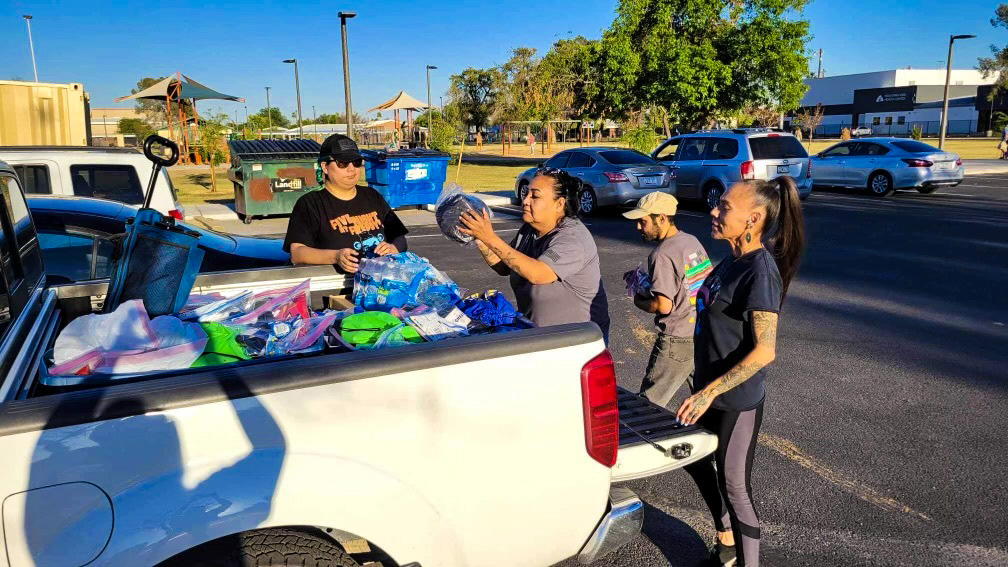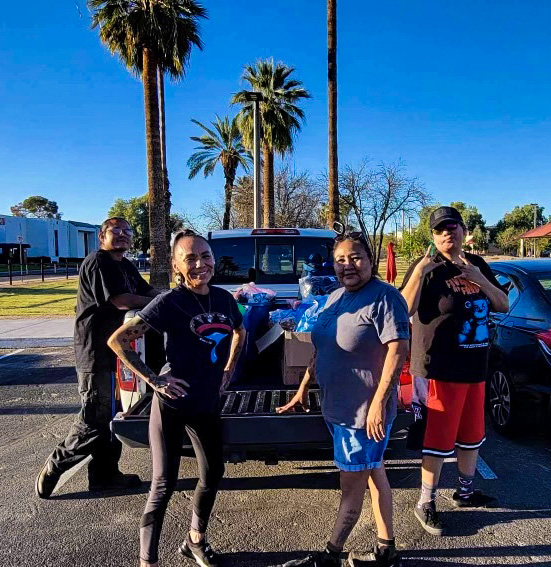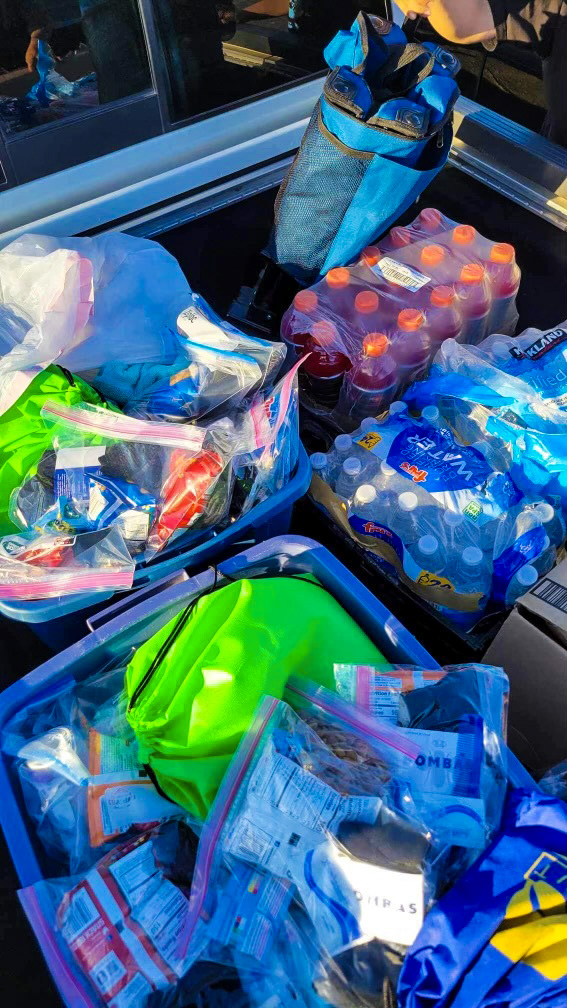Indianz.Com > News > Cronkite News: Native people targeted by fake sober living homes

Indigenous advocates work to combat fake sober living homes in Arizona
Friday, May 10, 2024
Cronkite News
PHOENIX – Jade Lara was five months pregnant in January 2022 when she arrived at a group home in San Tan Valley with the promise of daily classes and group therapy to help her with sobriety. However, when she arrived, she was met with a lack of assistance and care and provided with only one therapy session a week held at a different center.
Lara noted the men in the co-ed home were given the freedom to “come and go,” often coming back clearly intoxicated. The situation turned dangerous the night she was sent to another center in Maricopa County, where an intoxicated man wouldn’t leave her or the other woman in the house alone.
“I was just like, no, this is enough,” Lara said. “I got my bag and then I used the last of my money that I had to get an Uber out of there because I was like, ‘I don’t trust this place.’”
Lara was in the second center for a week before she left, walking the streets of Phoenix before a friend connected her with a reputable sober living home.
Lara, who is Navajo, is one of thousands of individuals who have fallen victim to a Medicaid scheme primarily affecting Indigenous communities. After legislation tackling the problem failed to pass this session, individuals are taking the issue into their own hands to protect vulnerable members of the community.
Goodyear Police Officer Scott Daniel, who serves on the city’s crisis intervention team, told lawmakers in February that he has seen many similar instances at group homes in the Valley.
“Noncompliant sober living homes are a growing concern within our cities and have been since 2019,” he said at an Arizona Senate Health and Human Services Committee meeting. “I myself have gone on numerous occasions and witnessed various issues with people coming out. We find them passed out in front of their homes and neighboring homes and backyards. There’s no one around, and if there is, there’s only one person … who is clearly not a behavioral specialist, or any type of specialist.”
Nearly a year after Gov. Katie Hobbs and Attorney General Kris Mayes announced a crackdown on a Medicaid scheme exploiting vulnerable Indigenous individuals, residents of tribal communities across the state are still calling on lawmakers to combat the issue.
The scam has involved unlicensed centers in Arizona that target individuals in tribal communities who are dealing with substance abuse or struggling with mental illness and lure them in with false promises of assistance at rehab centers or sober living centers. Officials say this scheme has cost the state an estimated $2.8 billion, according to 12 News.
Scammers exploit the Arizona Health Care Cost Containment System (AHCCCS) by creating pop-up centers across the Valley that take advantage of the American Indian Health Program and collecting thousands of dollars a day in federal funds for bogus or shoddy services.
The Arizona Department of Health Service’s annual sober living report substantiates the magnitude of the problem, lawmakers say. From 2021 to 2023, the issuance of new sober living licenses surged from 52 to 470, while complaints soared from 94 to 446 – an increase of over 370%. Moreover, enforcement actions against licensed homes by the department skyrocketed from 97 to over 2,000 during the same period.
How advocates are working to protect the Indigenous community
Reva Stewart, a Navajo activist who has been working to locate missing community members and bring this issue to the attention of authorities, describes her efforts as a “full-time second job.”
Stewart is the founder of Stolen People, Stolen Benefits, a grassroots organization focused on raising awareness of the issue and bringing victims home. With the assistance of fellow advocate Coleen Chatter, Stewart has tracked down numerous individuals and raised over $10,000 to pay for food and bus tickets to get them home to their families after leaving fraudulent rehab centers.
Stewart’s involvement in the issue came after her cousin was picked up by an unmarked van in Farmington, New Mexico.
“She told me that they had picked her up in Farmington and they had picked up four people all at the same time. And on the way down, they told her … whatever they could to convince her that they were just going for a day trip,” Stewart said. “So she got in and they bought alcohol for them. She said they just pretty much kept them intoxicated all the way down.”
Upon arriving at a group home in Phoenix, her cousin was told to sign up for AHCCCS benefits, but when she refused to provide personal information, she was forced to leave with no way of getting back to New Mexico.
According to Stewart, this is a common mark of the scam – targeted individuals are often found on the street or at bus stops, flea markets and medical centers. They are picked up in SUVs or unmarked vans and left with no means to get back to their homes.
Stewart said she believes Native communities are being targeted because of their high missing and murdered population.
“They see that they’re homeless and they’ve got alcohol problems, and with our huge, huge missing and murdered Indigenous women, people, families, everything, (they think) that we’re not going to find them. They think that they don’t have families behind them and that if they’re unsheltered on the reservation, nobody cares,” Stewart said.
According to a 2021 report by the state health department, Native Americans are 500% more likely to experience alcohol-induced deaths and have a 20% higher likelihood of dying from drug-induced deaths than the average Arizonan.
Mandy Hagen, who started working with advocates to address the issue in October 2022, has heard of numerous instances of abuse in behavioral health facilities.
“I have seen both men and women being verbally and physically abused by their quote-unquote ‘clinicians.’ There’s lots of abusive behavior,” Hagen said. “They’re almost kind of treated like, ‘We’re giving you a free place to stay and we’re giving you all these things, so, therefore, we can treat you any way we want to.’”
To aid in finding missing individuals, Hagen contacts treatment centers suspected of holding them and requests that they facilitate communication between the person and their loved ones.
“Obviously (because of) HIPAA, they can’t tell me if they’re there,” Hagen said, referring to the federal law that assures the privacy of a person’s medical information. “But I’ll just reach out to my contact and say, ‘Hey, this person has been reported missing. They were last seen or heard from at your facility. Can you just please have them reach out to their family?’”
Lucrecia Belmont, a Minnesota retiree, reached out to Stewart after seeing a post about the scam. She now works closely with advocates to track down locations of supposed homes, using a public database to find the center’s National Provider Identifier numbers, which are identification numbers given to covered and licensed health care providers.
Though these online databases are free to use, many do not know how to access or navigate the technology, Belmont said.
“I think if more people kind of understood just the basics of how to do some of these searches, general community members would be able to do a lot more watching out for each other,” Belmont said. “A big component of it has got to be the community really networking some solidarity and protection for each other, and that’s something we’re working on.”

Getting lawmakers involved
Arizona Sen. Theresa Hatathlie, D-Tuba City, who is a member of the Navajo Nation, recently sponsored a bill aiming to regulate fraudulent sober living homes, but the legislation failed to pass in the House.
“I can count on both of my hands, my fingers and my toes the number of people who have died in this type of facility,” Hatathlie said during a Senate Health and Human Services Committee meeting in February. “To make sure that they’re going to be held accountable and to make sure that the families will be able to take their loved one home, I think, is not too big of an ask.”
During hearings for the legislation, Hatathlie stressed the importance of state agencies – such as the health department, the attorney general and the Arizona Corporation Commission – working together to tackle the issue, and said that a lack of communication between departments has allowed for the scam to continue.
“These criminals, their licenses are being suspended. They’re being revoked. They (departments) are not communicating it to ACC,” she said. “So these criminals, they go … and they buy more licenses. In a few hours in between or even in a day, they come out with 20 to 50 licenses, and they just move shop to the next community, to the next neighborhood and they continue to commit crime. That’s why it’s very important that we address this in a comprehensive fashion.”
The primary opposition to the bill came in the form of licensed behavioral health facilities that argued that the legislation imposed excessive restrictions beyond targeting scam centers.
“The intent of the bill is well-founded, but my concern is more the unintended effect on other facilities,” lobbyist Don Isaacson said. “In many cases, it’s directed not just at sober living or at behavioral health facilities that operated poorly, but it hits every residential care facility.”
Another less expansive bill aimed at the scheme, sponsored by Sen. Frank Carroll, R-Sun City West, failed to receive a third hearing before the legislative deadline. It would have increased regulations and fines for unlicensed homes and mandated on-site inspections.
AHCCCS has made changes in its system in an attempt to fight the scheme. The agency extended a moratorium for enrolling new behavioral health clinics for Medicaid billing until June 8. It also instituted tighter controls for sober-living facilities, including requirements for fingerprint clearance background checks and site visits for certain types of behavioral health facilities.
Currently, advocates are focusing their efforts on spreading advice on how to stay safe and avoid the scheme. They warn that if an individual approaches offering assistance, they are likely tied to an unethical treatment center, as reputable treatment centers do not send drivers to recruit people on the street.
According to Hagen, the best way to receive reputable help is to get connected to licensed, ethical care providers through social workers, case managers, primary care clinics or resource centers.
“If you think that you have a substance-use issue, instead of going directly with somebody who’s offering you free housing, go to your behavioral health services,” Hagen said. “A lot of the tribes have behavioral health services. Whether it’s an actual behavioral health services building, a hospital or detox, I would go and talk to somebody that can refer you appropriately.”
For more stories from Cronkite News, visit cronkitenews.azpbs.org.
Note: This story originally appeared on Cronkite News. It is published via a Creative Commons license. Cronkite News is produced by the Walter Cronkite School of Journalism and Mass Communication at Arizona State University.
Search
Filed Under
Tags
More Headlines
Native America Calling: Tribal broadcasters brace for federal funding fight
Native America Calling: Assessing current health threats to Indian Country
‘I am finally going home’: Leonard Peltier released from prison after nearly five decades
NAFOA: 5 Things You Need to Know this Week (February 18, 2025)
Chuck Hoskin: Cherokee Nation supports our artists
Native America Calling: Native activism marks victory with Leonard Peltier’s release
Native America Calling: What Indigenous people in Greenland really want
Native America Calling: Traditional love stories
RECAP: National Congress of American Indians continues big meeting in DC
Native America Calling: Honoring artists who demonstrate community spirit
RECAP: National Congress of American Indians opens big meeting in DC
‘We stand firm. We hold our ground’: Federal freeze impacts tribal gathering in nation’s capital
AUDIO: The 2025 State of Indian Nations in Washington, D.C.
RECAP: National Congress of American Indians hosts State of Indian Nations
Chuck Hoskin: Cherokee Nation empowers new generation of agriculture stewards
More Headlines
Native America Calling: Assessing current health threats to Indian Country
‘I am finally going home’: Leonard Peltier released from prison after nearly five decades
NAFOA: 5 Things You Need to Know this Week (February 18, 2025)
Chuck Hoskin: Cherokee Nation supports our artists
Native America Calling: Native activism marks victory with Leonard Peltier’s release
Native America Calling: What Indigenous people in Greenland really want
Native America Calling: Traditional love stories
RECAP: National Congress of American Indians continues big meeting in DC
Native America Calling: Honoring artists who demonstrate community spirit
RECAP: National Congress of American Indians opens big meeting in DC
‘We stand firm. We hold our ground’: Federal freeze impacts tribal gathering in nation’s capital
AUDIO: The 2025 State of Indian Nations in Washington, D.C.
RECAP: National Congress of American Indians hosts State of Indian Nations
Chuck Hoskin: Cherokee Nation empowers new generation of agriculture stewards
More Headlines
